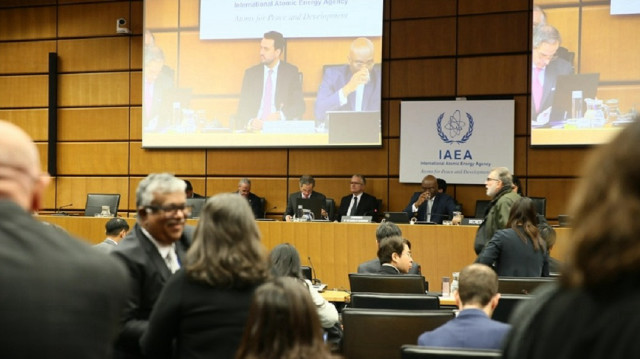

File photo
Geneva discussions mark first step toward negotiations; US absent from talks
Iran is preparing to engage in discussions with the UK, France, and Germany, marking a potential initial step toward reviving nuclear negotiations.
Recent developments, including Iran's intensified nuclear activities, Donald Trump's second term in office as president returning following his earlier withdrawal of the US from the nuclear deal, and renewed efforts by European signatories, have refocused global attention on Tehran's nuclear program.
Iran's nuclear advancements have reached a critical juncture, affecting regional stability, international oversight, and global diplomatic efforts.
Despite mounting pressure from the US and certain European nations, the European parties to the nuclear agreement have prioritized a return to diplomatic channels.
- Origins of Iran's nuclear program and nuclear deal
Iran's nuclear ambitions originated in the 1950s during the Shah's rule, initially supported by the United States. However, progress slowed after the 1979 Iranian Revolution due to escalating tensions with the West. Later, the program gained momentum with assistance from Russia in its early stages.
In the early 2000s, Iran's covert nuclear activities came to light, prompting the International Atomic Energy Agency (IAEA) to express concerns about Tehran's potential use of nuclear technology for military purposes rather than peaceful energy generation.
The Joint Comprehensive Plan of Action (JCPOA), commonly referred to as the nuclear deal, was finalized on July 14, 2015. The agreement involved Iran and the permanent members of the UN Security Council—comprising the US, UK, France, Russia, and China—alongside Germany (P5+1).
The deal, which regulated Iran's nuclear activities under strict monitoring in exchange for lifting international sanctions, was implemented in January 2016 following UN Security Council approval. This provided Iran with partial relief from economic sanctions.
However, the agreement unraveled when the US, under the presidency of Donald Trump, unilaterally withdrew on May 8, 2018, and reinstated sanctions on Iran. In response, Tehran began exceeding the deal's uranium enrichment limits, gradually escalating its nuclear activities.
- Trump's withdrawal led to the collapse of the nuclear deal
Trump's decision to pull the US out of the nuclear agreement is widely regarded as the catalyst for its breakdown.
Following the US assassination of Iranian General Qasem Soleimani in 2020, Tehran further ramped up its uranium enrichment activities, exceeding the thresholds established by the agreement.
The situation deteriorated further after the November 2020 assassination of Iranian nuclear scientist Mohsen Fakhrizadeh. In reaction, Iran's parliament passed a law to accelerate its nuclear program.
- Advanced centrifuges installed for faster uranium enrichment
Iran replaced the first-generation IR-1 centrifuges, which were allowed under the nuclear agreement, with advanced IR-8 and IR-9 centrifuges, significantly enhancing its uranium enrichment capabilities.
On Jan. 5, 2021, the Atomic Energy Organization of Iran declared that uranium was being enriched to 20% purity at the Fordow facility, under the supervision of IAEA inspectors, as part of the newly passed law.
In April 2021, Iran announced for the first time that it had achieved uranium enrichment of 60% purity.
- Iran activates advanced centrifuges in response to IAEA resolution
The latest report by the IAEA highlighted Iran's continued increase in enriched uranium stockpiles, confirming that Tehran now possesses the capability to produce nuclear weapons if it chooses to do so.
Subsequently, a resolution introduced by the UK, France, and Germany, with US backing, was adopted by the IAEA Board of Governors.
Passed with 19 votes in favor, 3 against, and 12 abstentions, the resolution criticized Tehran for inadequate cooperation with the IAEA and urged immediate compliance with the agency's demands.
In response, Iran activated advanced centrifuges at its nuclear facilities, allowing for even faster uranium enrichment.
- First step toward a second negotiation process
Amid escalating tensions, deputy foreign ministers from Iran and the European signatories of the nuclear deal—namely the UK, France, and Germany—are set to convene in Geneva, Switzerland, on Friday. The US will not be directly participating in these talks.
#Iran
#Iran nuclear negotiations
#European powers
